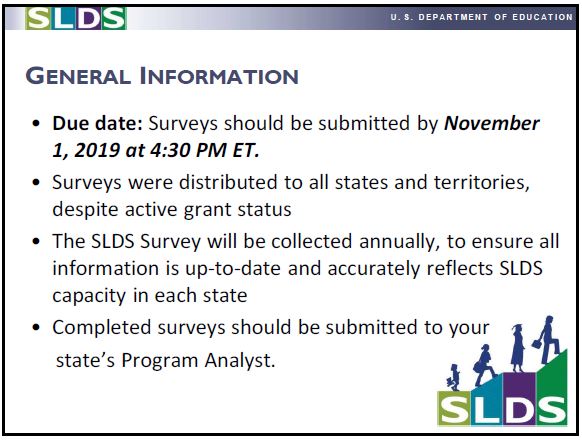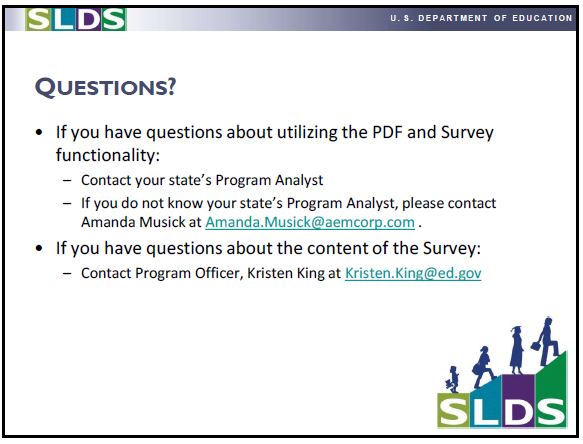Change Sheet Memo
SLDS Survey 2019 Schedule Change Memo.docx
State Longitudinal Data System (SLDS) Survey 2017-2019
Change Sheet Memo
OMB: 1850-0933
Memorandum United States Department of Education
Institute of Education Sciences
National Center for Education Statistics
DATE: August 28, 2019
TO: Robert Sivinski, OMB
THROUGH: Kashka Kubzdela, OMB Liaison, NCES
FROM: Nancy Sharkey, SLDS Program Officer, NCES
Kristen King, SLDS Program Officer, NCES
SUBJECT: Statewide Longitudinal Data System (SLDS) Survey 2019 Change Request (OMB# 1850-0933 v.7)
As authorized by the Educational Technical Assistance Act of 2002, Title II, the Statewide Longitudinal Data Systems (SLDS) Grant Program has awarded competitive, cooperative agreement grants to states since 2005. Through grants and a growing range of services and resources, the program has helped propel the successful design, development, implementation, and expansion of K12 and P-20W (early learning through the workforce) longitudinal data systems. These systems are intended to enhance the ability of States to efficiently and accurately manage, analyze, and use education data, including individual student records. The SLDSs should help states, districts, schools, educators, and other stakeholders to make data-informed decisions to improve student learning and outcomes; as well as to facilitate research to increase student achievement and close achievement gaps. The SLDS grants extend for three to five years for up to twenty million dollars per grantee, and grantees are obligated to submit annual reports and a final report on the development and implementation of their systems. All 50 states, five territories, and the District of Columbia are eligible to apply, and each state can apply multiple times to develop different aspects of their data system. Since November 2005, 97 grants have been awarded. In addition to the grants, the program offers many services and resources to assist education agencies with SLDS-related work. Best practices, lessons learned, and non-proprietary products/solutions developed by recipients of these grants and other states are disseminated to aid all state and local education agencies. The request to formalize the annual SLDS Interim Progress Report (IPR) as the SLDS Survey, intended to provide insight on state and U.S. territory SLDS capacity for automated linking of K-12, teacher, postsecondary, workforce, career and technical education (CTE), adult education, and early childhood data, and to conduct the annual SLDS Survey from 2017 through 2019 was approved in February 2017 with the latest update approved in July 2018 (1850-0933 v.1-6). The SLDS Survey helps inform ongoing evaluation and targeted technical assistance efforts to enhance the quality of the SLDS Program’s support to states. This request is to change the approved time schedule of the 2019 administration of the SLDS Survey, and to provide minor language revisions to survey items and definitions to make the concepts easier to understand and more consistent across sectors of the SLDS survey. We will begin administering the 2019 SLDS Survey in October 2019.
We are requesting to modify the 2019 collection schedule because we are experiencing delays with the release of two publications from the previous collections (2017, 2018), where indicator tables will be made available to the public in the form of a Stats-In-Brief. This request does not impact the approved response burden or the total cost to the federal government for conducting this survey.
We revised documents in this submission as follows (text in blue font denotes edits):
Part A
6. Frequency of Data Collection
The SLDS Survey will be an annual survey that will begin in April 2017, next in in August of 2018, and then in October of 2019. Nationwide, SLDS system capacity changes frequently (ex. Infrastructure enhancements, evolving P20W agency collaborations, State legislation impacts, etc.), so collecting data less often would make the information too obsolete to be useful for targeted technical assistance planning.
Time Schedule for SLDS Survey
In 2019, the SLDS Survey data collection will begin in October due to a need to add concept definitions and better consistency in language across the instrument (submitted for approval to OMB as a change request in August 2019).
2019 & 2020 Timeline |
SLDS Survey Collection, Processing, and Publication |
October 2019 |
Email instructions to SEA respondents |
October 2019 |
One or two webinars for SEA stakeholders, on an as-needed basis, to provide more information about the Survey, how to complete the instrument, NCES’s planned use of the data, and to address respondents’ questions about the Survey |
October 15–31, 2019 |
Survey final reminder email |
November 1, 2019 |
SEAs are urged to have finished submitting accurate and complete data |
November 15, 2019 |
Mandatory final submission date |
November-December 2019 |
Response by SEA’s to requests for clarification, reconciliation, or other inquiries from NCES. All data issues to be resolved. No files are accepted after close-out. |
March 15, 2020 |
NCES review of files, file documentation, and brief analysis completed. Provisional responses available for internal use but not publication |
July 15, 2020 |
Indicator tables and use cases become public, NCES website updated. Current year collection data will be available to assess and respond to ad hoc requests |
July 15 – September 2020 |
Respondents have the option to make update, change, or reconciliation requests to adjust state-specific data reflected in the SLDS Survey public indicator tables |
Part B
3. Methods for Maximizing Response Rates
2019 SLDS Survey Administration:
Non-active grantee contact information retrieval is ongoing, and will be completed prior to the beginning of the data collection.
SLDS Survey will be sent to all States/U.S territories via email in October of 2019. (APPENDIX A – Introductory Email Script).
Non-response follow-up will take place from late October through November 15th:
Non-Response Follow-Up Email sent (APPENDIX C).
Non-Response call process (APPENDIX D) to begin late October through November 15th deadline.
Webinars (APPENDIX B):
NCES will host one or two webinars annually, on an as needed basis, to provide more information about the Survey, how to complete the instrument, NCES’s planned use of the data, and to answer any questions from respondents.
Respondents will be invited to webinars via listserv email invitation.
Appendix A-D
Webinar references to 2018 have been revised so that 2019 dates are provided, and contacts are most current:


Instrument
On the cover page of the SLDS 2019 Survey, directory information fields were added asking for “Grantee Name” as well as “Project Director Name” and project director’s contact information.
The following changes have been made to the instrument for definition, consistency and grammar purposes:
Item # |
Existing language |
New language |
Reason |
24d |
Resources for public and community members (e.g. dashboards, scorecards) |
Resources for public, parents, and community members (e.g. dashboards, scorecards) |
Match all of the other sector questions about data use (e.g., 10c) |
4dii) |
High school (e.g. graduation rates, SAT scores) |
High schools (e.g., graduation rates, SAT scores) |
Grammar and consistency |
18ai) |
High schools |
High schools (e.g., graduation rates, SAT scores) |
Consistency between questions 10 and 18 |
24ai |
District-level, college-going and employment outcomes |
District (college-going and employment outcomes) |
Grammar fix |
24aii |
Regional-level, college-going and employment outcomes |
Regional (college-going and employment outcomes) |
Grammar fix |
24aiii |
Adult education programs, college-going and employment outcomes |
Adult education programs (college-going and employment outcomes) |
Grammar fix |
24aiv |
Community colleges, transfer and employment outcomes |
Community colleges (transfer and employment outcomes) |
Grammar fix |
24av |
4-year postsecondary institutions, transfer or continuing education and employment outcomes |
4-year postsecondary institutions (transfer or continuing education and employment outcomes) |
Grammar fix |
4j |
Programs/intervention needs |
Program/intervention needs |
Grammar |
10d |
Retention/transfer/promotion |
Educator retention/transfer/promotion |
|
General |
|
Add links to definitions where relevant |
Questions about definitions |
2m |
footnote defining “other programs”: “Section 5” |
“Section 504” |
|
7 |
Automated infrastructure |
Add link to definitions and add definition: a hands-off technological solution that does not require manual configuration to complete |
|
39c |
From K12 to postsecondary institutions in state through E-transcripts |
From K12 to postsecondary institutions in state through E-transcripts (including electronic PDFs) |
|
Definitions |
Acronyms used inconsistently |
Use spelled out and then in an acronym; add linking definition |
|
| File Type | application/vnd.openxmlformats-officedocument.wordprocessingml.document |
| File Title | Memorandum United States Department of Education |
| Author | King, Kristen |
| File Modified | 0000-00-00 |
| File Created | 2021-01-15 |
© 2026 OMB.report | Privacy Policy